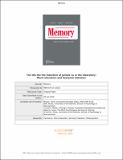Files in this item
The the the the induction of jamais vu in the laboratory : word alienation and semantic satiation
Item metadata
| dc.contributor.author | Moulin, Chris J. A. | |
| dc.contributor.author | Bell, Nicole | |
| dc.contributor.author | Turunen, Merita | |
| dc.contributor.author | Baharin, Arina | |
| dc.contributor.author | O'Connor, Akira R. | |
| dc.date.accessioned | 2021-02-20T00:35:43Z | |
| dc.date.available | 2021-02-20T00:35:43Z | |
| dc.date.issued | 2020-02-20 | |
| dc.identifier | 266234369 | |
| dc.identifier | a76f4c61-da7a-47b3-8b74-bf858e834e8c | |
| dc.identifier | 85081030230 | |
| dc.identifier | 000515014800001 | |
| dc.identifier.citation | Moulin , C J A , Bell , N , Turunen , M , Baharin , A & O'Connor , A R 2020 , ' The the the the induction of jamais vu in the laboratory : word alienation and semantic satiation ' , Memory , vol. Latest Articles . https://doi.org/10.1080/09658211.2020.1727519 | en |
| dc.identifier.issn | 0965-8211 | |
| dc.identifier.other | ORCID: /0000-0002-7943-5183/work/69834921 | |
| dc.identifier.uri | https://hdl.handle.net/10023/21466 | |
| dc.description.abstract | Jamais vu is a phenomenon operationalised as the opposite of déjà vu, i.e. finding subjectively unfamiliar something that we know to be familiar. We sought to document that the subjective experience of jamais vu can be produced in word alienation tasks, hypothesising that déjà vu and jamais vu are similar experiential memory phenomena. Participants repeatedly copied words until they felt “peculiar”, had completed the task, or had another reason to stop. About two-thirds of all participants (in about one-third of all trials) reported strange subjective experiences during the task. Participants reported feeling peculiar after about thirty repetitions, or one minute. We describe these experiences as jamais vu. This experimentally induced phenomenon was related to real-world experiences of unfamiliarity. Although we replicated known patterns of correlations with déjà vu (age and dissociative experiences), the same pattern was not found for our experimental analogue of jamais vu, suggesting some differences between the two phenomena. However, in daily life, those people who had déjà vu more frequently also had jamais vu more frequently. Findings are discussed with reference to the progress that has been made in déjà vu research in recent years, with a view to fast-tracking our understanding of jamais vu. | |
| dc.format.extent | 10 | |
| dc.format.extent | 283738 | |
| dc.language.iso | eng | |
| dc.relation.ispartof | Memory | en |
| dc.subject | Familiarity | en |
| dc.subject | Word alienation | en |
| dc.subject | Semantic satiation | en |
| dc.subject | Metacognition | en |
| dc.subject | BF Psychology | en |
| dc.subject | NDAS | en |
| dc.subject.lcc | BF | en |
| dc.title | The the the the induction of jamais vu in the laboratory : word alienation and semantic satiation | en |
| dc.type | Journal article | en |
| dc.contributor.institution | University of St Andrews. School of Psychology and Neuroscience | en |
| dc.identifier.doi | https://doi.org/10.1080/09658211.2020.1727519 | |
| dc.description.status | Peer reviewed | en |
| dc.date.embargoedUntil | 2021-02-20 |
This item appears in the following Collection(s)
Items in the St Andrews Research Repository are protected by copyright, with all rights reserved, unless otherwise indicated.

